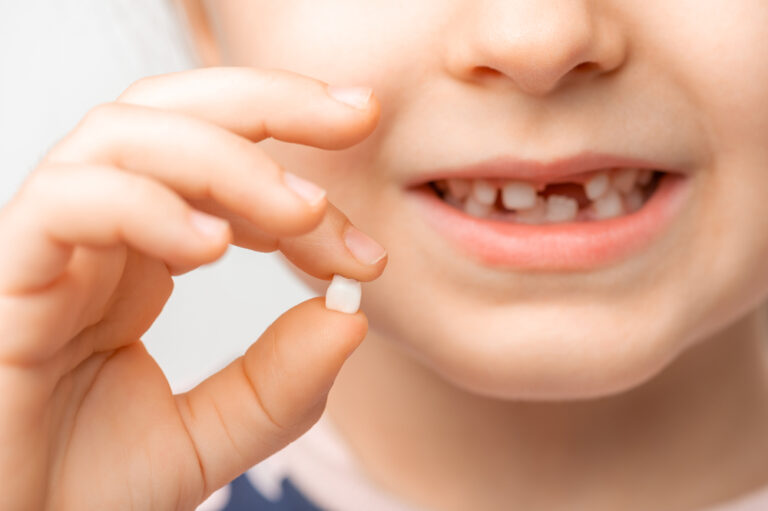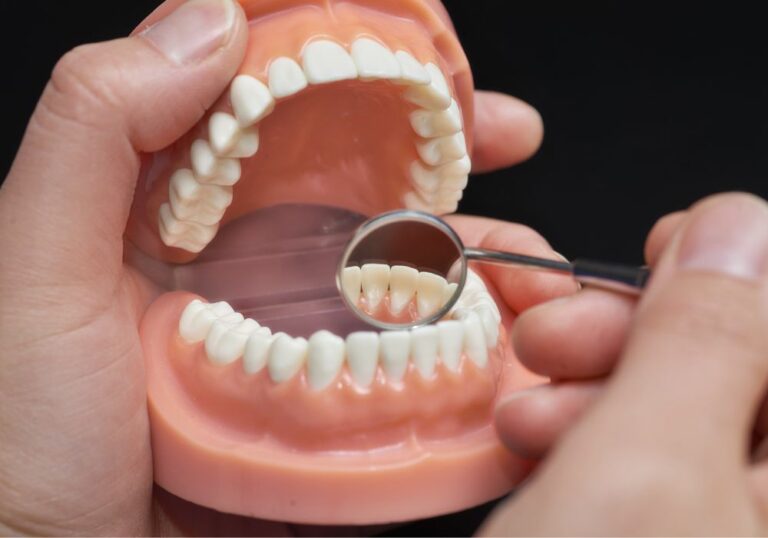Are you struggling to brush your cat’s teeth? It can be challenging to maintain your cat’s oral health without brushing its teeth with a toothbrush. However, using natural products can be a convenient and effective way to keep your cat’s teeth and gums healthy.
One of the best natural products to use for brushing your cat’s teeth is coconut oil. Coconut oil has antimicrobial properties that can help reduce the bacteria in your cat’s mouth. It also has a pleasant taste that most cats enjoy, making it easier to brush their teeth. You can simply apply a small amount of coconut oil to your cat’s teeth and gums using a toothbrush or your finger.
Another natural product that can be used to brush your cat’s teeth is baking soda. Baking soda is an alkaline substance that can help neutralize the acids in your cat’s mouth, reducing the risk of tooth decay. You can mix a small amount of baking soda with water to create a paste and apply it to your cat’s teeth using a toothbrush or your finger. However, it’s important to use baking soda in moderation as it can be abrasive and damage your cat’s tooth enamel if used excessively.
Understanding Your Cat’s Oral Health
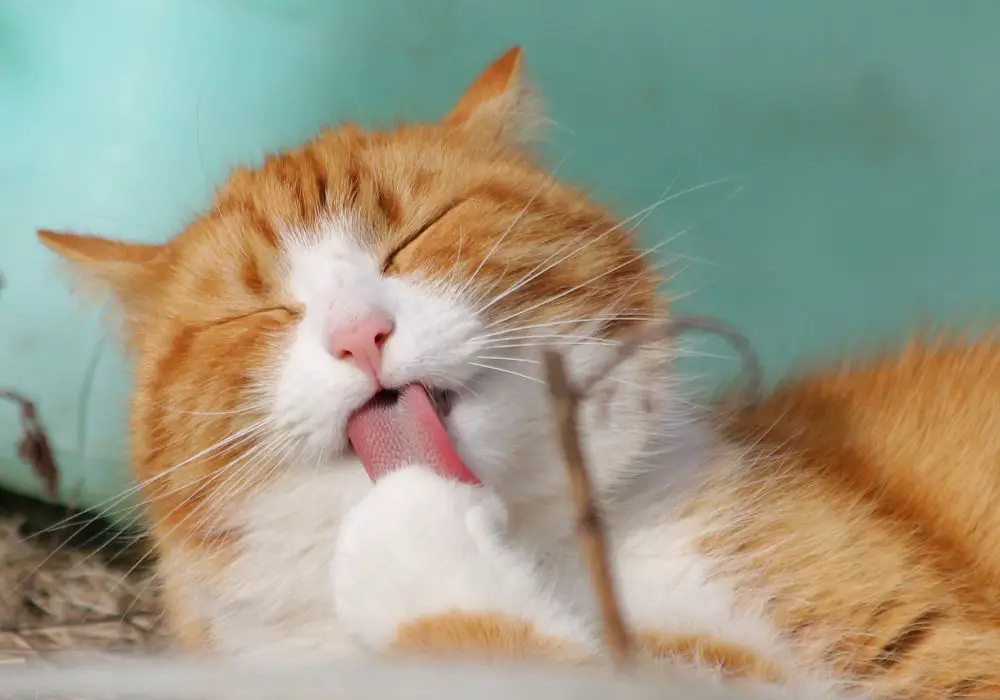
Taking care of your cat’s oral health is essential for their overall well-being. Just like humans, cats can suffer from dental problems, including tooth decay, gum disease, and bad breath. However, unlike humans, cats cannot brush their teeth themselves, which means it’s up to you to keep their teeth clean and healthy.
Here are some things to keep in mind when it comes to your cat’s oral health:
Signs of Dental Problems
It’s important to keep an eye out for any signs of dental problems in your cat. Some common signs include bad breath, swollen or bleeding gums, loose teeth, and difficulty eating. If you notice any of these signs, it’s important to take your cat to the vet as soon as possible.
Preventative Measures
Prevention is key when it comes to your cat’s oral health. One of the best things you can do is brush your cat’s teeth regularly. Use a toothbrush and toothpaste made specifically for cats, and be sure to start slowly and gradually work up to brushing their teeth daily.
In addition to brushing, there are other things you can do to keep your cat’s teeth healthy, including:
- Feeding them a balanced diet that includes wet food and biscuits
- Avoiding sugary human foods and limiting sweets
- Providing them with dental chews or toys to help clean their teeth
Professional Dental Care
Even with regular brushing and preventative measures, your cat may still need professional dental care from time to time. Your vet may recommend a dental cleaning or other treatments to help keep your cat’s teeth and gums healthy.
In summary, taking care of your cat’s oral health is essential for their overall well-being. Keep an eye out for signs of dental problems, take preventative measures, and seek professional dental care when necessary. By doing so, you can help ensure that your cat has a healthy and happy life.
Why Natural Products?
Taking care of your cat’s dental health is crucial for their overall well-being. Daily maintenance, such as brushing their teeth, can prevent dental problems and save you from costly vet bills. However, when it comes to choosing the right product to use, it’s essential to consider the ingredients.
Using natural products to brush your cat’s teeth is a safer and healthier option than using chemical-laden products. Natural products are gentle on your cat’s teeth and gums, and they don’t contain any harmful additives that could cause health problems. Here are some reasons why you should use natural products to brush your cat’s teeth:
1. No Harmful Chemicals
Most commercial dental products contain chemicals such as preservatives, artificial flavors, and colors, which can be harmful to your cat’s health. These chemicals can cause allergic reactions, skin irritations, and even internal organ damage. Natural products, on the other hand, are made from natural ingredients that are safe and gentle on your cat’s teeth and gums.
2. Effective Cleaning
Natural products can effectively clean your cat’s teeth and remove plaque and tartar buildup. They contain natural enzymes and antibacterial properties that break down bacteria and prevent the formation of new plaque. Natural products such as dental gels, sprays, and water additives can be just as effective as traditional toothpaste.
3. Cost-Effective
Using natural products to brush your cat’s teeth can be cost-effective in the long run. While the initial cost may be higher than traditional dental products, natural products can prevent dental problems and save you from costly vet bills. By using natural products regularly, you can maintain your cat’s dental health and avoid expensive dental procedures.
In conclusion, using natural products to brush your cat’s teeth is a safer and healthier option than using chemical-laden products. Natural products are gentle on your cat’s teeth and gums, effective in cleaning, and cost-effective in the long run. By choosing natural products, you can maintain your cat’s dental health and ensure their overall well-being.
Coconut Oil

Coconut oil is a popular natural product that can be used to brush your cat’s teeth. It has many benefits and is easy to use. Here’s what you need to know:
Benefits
Coconut oil has several benefits for your cat’s dental health. It contains natural antioxidants and is antibacterial, which can help fight off harmful bacteria in your cat’s mouth. Coconut oil can also help soften plaque and tartar, making it easier to remove. Additionally, most cats love the taste of coconut oil because it’s rich in fatty acids.
How to Use
Using coconut oil to brush your cat’s teeth is easy. Here’s how to do it:
- Start by getting your cat used to the taste of coconut oil. You can do this by offering them a small amount on your finger or a spoon. Most cats love the taste and will lick it up eagerly.
- Once your cat is used to the taste, you can start brushing their teeth with coconut oil. Dip a clean toothbrush or a piece of gauze in the oil and gently rub it on your cat’s teeth and gums.
- Brush for about 30 seconds on each side of your cat’s mouth, then let them lick the remaining coconut oil off their teeth.
- Repeat this process every day for best results.
It’s important to note that coconut oil should not replace regular dental checkups with your veterinarian. While it can help improve your cat’s dental health, it’s not a substitute for professional dental care.
In summary, coconut oil is a natural product that can be used to brush your cat’s teeth. It has several benefits, including its antibacterial properties and ability to soften plaque and tartar. To use coconut oil, get your cat used to the taste, then brush their teeth with a toothbrush or gauze dipped in the oil. Repeat this process daily for best results.
Turmeric
Turmeric is a natural product that can be used to brush your cat’s teeth. It is a spice that has been used for centuries in traditional medicine due to its anti-inflammatory and antioxidant properties. Turmeric contains an active ingredient called curcumin, which provides many health benefits.
Benefits
Turmeric has several benefits for your cat’s dental health. It can help to prevent the buildup of plaque and tartar on your cat’s teeth, which can lead to dental problems such as gum disease and tooth decay. Turmeric also has antibacterial properties that can help to kill the bacteria that cause bad breath.
In addition to its dental benefits, turmeric has many other health benefits for your cat. It can help to boost your cat’s immune system, reduce inflammation, and improve digestion.
How to Use
To use turmeric to brush your cat’s teeth, you can make a homemade toothpaste using turmeric powder and other natural ingredients. Here’s a simple recipe:
Ingredients:
- 1/4 cup coconut oil
- 1 tablespoon turmeric powder
- 1/4 teaspoon dried parsley
- 1/4 teaspoon dried mint
Instructions:
- Melt the coconut oil in a small saucepan over low heat.
- Add the turmeric powder, dried parsley, and dried mint to the melted coconut oil and stir well.
- Allow the mixture to cool and solidify.
- Scoop a small amount of the toothpaste onto a soft-bristled toothbrush or your finger.
- Gently brush your cat’s teeth in a circular motion for 30 seconds to 1 minute.
- Rinse your cat’s mouth with water.
It’s important to note that turmeric can stain surfaces and fabrics, so be careful when using it to brush your cat’s teeth. You may also want to consult with your veterinarian before using any natural products on your cat’s teeth to ensure that they are safe and effective.
Parsley Water
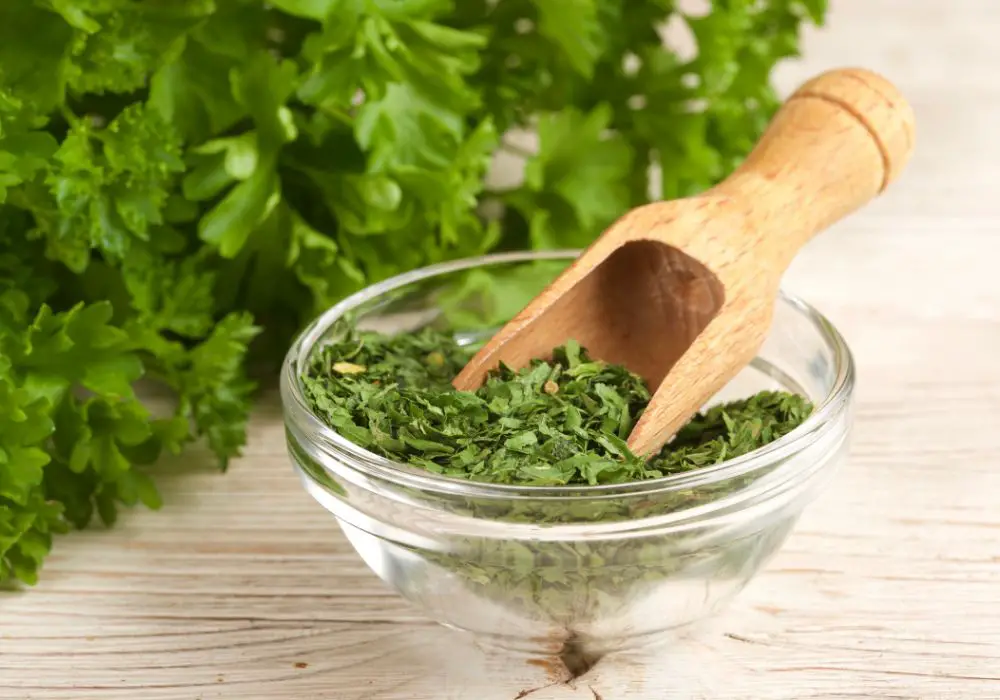
Benefits
Parsley is a natural herb that can help freshen your cat’s breath and improve their dental health. It contains chlorophyll, which has antibacterial properties that can help fight against bad breath and prevent the growth of harmful bacteria in your cat’s mouth. Additionally, parsley is a good source of vitamins A and C, which promote overall health.
How to Use
To make parsley water, simply boil a handful of fresh parsley in a pot of water for 10-15 minutes. Let the mixture cool to room temperature, then strain out the parsley leaves. You can use this parsley water as a rinse for your cat’s mouth after meals or as a natural toothbrushing solution.
To use parsley water as a mouth rinse, simply pour a small amount into your cat’s mouth and let them swish it around for a few seconds before spitting it out. You can also soak a cotton ball in the parsley water and use it to wipe your cat’s teeth and gums.
If you want to use parsley water as a toothbrushing solution, soak a soft-bristled toothbrush in the parsley water and gently brush your cat’s teeth and gums. Be sure to use a toothbrush that is specifically designed for cats and a toothpaste that is safe for them to swallow.
It’s important to note that while parsley water can be a helpful natural remedy for your cat’s dental health, it should not be used as a substitute for regular veterinary care. Be sure to take your cat to the vet for regular checkups and dental cleanings to ensure their teeth and gums stay healthy.
Cucumber Juice
If you’re looking for a natural product to brush your cat’s teeth, cucumber juice is a great option to consider. Here is some information about the benefits of cucumber juice and how to use it.
Benefits
Cucumber juice has several benefits that make it an excellent choice for brushing your cat’s teeth. Some of these benefits include:
- Freshens breath: Cucumber juice has a fresh, mild taste that can help freshen your cat’s breath.
- Contains vitamins: Cucumber juice is a good source of vitamins A and C, which can help support your cat’s overall health.
- Natural cleanser: Cucumber juice can help remove plaque and tartar from your cat’s teeth, promoting better oral health.
How to Use
To use cucumber juice to brush your cat’s teeth, follow these steps:
- Start by cutting a cucumber into small pieces and blending it in a food processor or blender until it becomes a smooth juice.
- Dip a soft-bristled toothbrush or gauze pad into the cucumber juice.
- Gently brush your cat’s teeth and gums, focusing on the areas where plaque and tartar tend to build up.
- Rinse your cat’s mouth with water to remove any remaining cucumber juice.
It’s important to note that while cucumber juice is safe for cats to ingest, it should not be used as a replacement for their regular diet. Additionally, if your cat has any dental issues or is experiencing discomfort during brushing, it’s best to consult with your veterinarian before trying any new dental care products.
Apple Cider Vinegar
If you’re looking for a natural product to help maintain your cat’s dental health, apple cider vinegar (ACV) is an option to consider. ACV is known for its antibacterial properties and can help kill the bacteria that cause plaque buildup and bad breath in cats. In this section, we’ll explore the benefits of apple cider vinegar and how to use it to brush your cat’s teeth.
Benefits
Apple cider vinegar has several benefits for your cat’s dental health. Here are a few:
- Kills bacteria: ACV has antibacterial properties that can help kill the bacteria that cause plaque buildup and bad breath in cats.
- Freshens breath: ACV can help freshen your cat’s breath by neutralizing odor-causing bacteria.
- Promotes healthy gums: ACV can help promote healthy gums by reducing inflammation and fighting off harmful bacteria.
How to Use
Before using apple cider vinegar to brush your cat’s teeth, it’s important to dilute it first. Here’s how you can use ACV to brush your cat’s teeth:
- Mix 1 teaspoon of apple cider vinegar with 1/4 cup of water.
- Soak a soft-bristled toothbrush in the solution.
- Gently brush your cat’s teeth and gums, focusing on the back molars where plaque buildup is most common.
- Rinse the toothbrush with water and repeat as necessary.
It’s important to note that apple cider vinegar should not be used as a replacement for regular dental care from a veterinarian. It should only be used as a supplement to your cat’s dental routine. If your cat has any dental issues or is on any medication, it’s important to consult with your veterinarian before using apple cider vinegar.
Precautions When Using Natural Products
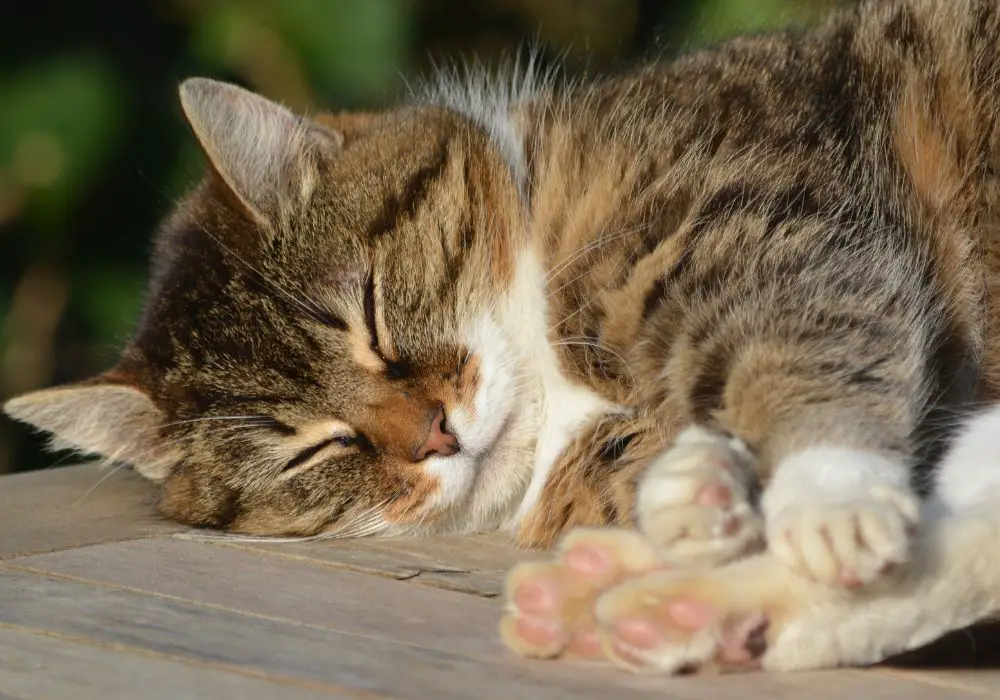
When using natural products to brush your cat’s teeth, it’s important to take certain precautions to ensure their safety and effectiveness. Here are some things to keep in mind:
Use Cat-Safe Ingredients
Not all natural products are safe for cats to ingest or use on their teeth. Make sure to research any ingredients you plan to use and only choose those that are known to be safe for cats. For example, coconut oil and kelp are often used in DIY cat toothpaste because they are safe and effective.
Avoid Harmful Chemicals
Just because a product is marketed as “natural” doesn’t mean it’s free of harmful chemicals. Some natural ingredients can be toxic to cats, while others may not be effective at cleaning their teeth. Be sure to read the label carefully and avoid any products that contain ingredients that are known to be harmful to cats.
Use the Right Tools
When brushing your cat’s teeth with natural products, it’s important to use the right tools. A soft-bristled toothbrush designed for cats is ideal, as it will be gentle on their teeth and gums. You should also use a toothpaste that is specifically formulated for cats, as human toothpaste can be harmful to them.
Start Slowly
If your cat is not used to having their teeth brushed, it’s important to start slowly and gradually work your way up to a full brushing. Begin by letting them taste the toothpaste and get used to the toothbrush, then gradually work up to brushing a few teeth at a time. This will help them get used to the process and make it more comfortable for them.
Consult with Your Vet
Before using any natural products to brush your cat’s teeth, it’s a good idea to consult with your veterinarian. They can provide guidance on which ingredients and products are safe and effective for your cat, as well as offer tips on how to make the brushing process more comfortable for them.
Regular Dental Check-Ups
Regular dental check-ups with your veterinarian are important for maintaining your cat’s oral health. During these check-ups, your vet will examine your cat’s teeth and gums for any signs of dental disease, such as plaque buildup, gingivitis, or periodontitis.
Your vet may also recommend a professional teeth cleaning if they notice any signs of dental disease. This involves using anesthesia to clean your cat’s teeth thoroughly, both above and below the gum line.
It’s important to note that dental disease can be painful for your cat and can lead to other health problems if left untreated. Regular dental check-ups can help catch any issues early on and prevent them from progressing.
In addition to regular check-ups, you can also ask your vet for advice on at-home dental care for your cat. This may include brushing your cat’s teeth, using dental chews or treats, or adding a dental rinse to their water.
Overall, regular dental check-ups with your veterinarian are an important part of maintaining your cat’s oral health and preventing dental disease. By staying on top of your cat’s dental care, you can help ensure that they stay healthy and happy for years to come.
Frequently Asked Questions
Can I use coconut oil to brush my cat’s teeth?
Yes, you can use coconut oil to brush your cat’s teeth. Coconut oil has antibacterial properties that can help reduce plaque and prevent gum disease. However, it’s important to note that coconut oil should not be the only method used to maintain your cat’s dental hygiene.
What are some natural alternatives to cat toothpaste?
There are a few natural alternatives to cat toothpaste that you can use to clean your cat’s teeth. Some of these include baking soda, coconut oil, and a mixture of water and apple cider vinegar. However, it’s important to note that these alternatives should be used in conjunction with regular brushing and dental check-ups.
Are dental treats effective for cleaning a cat’s teeth?
Dental treats can be effective for cleaning a cat’s teeth to some extent. They are designed to help reduce plaque and tartar buildup, but they should not be relied on as the sole method of maintaining your cat’s dental hygiene. Regular brushing and dental check-ups are still necessary.
How can I make my own natural cat toothpaste?
You can make your own natural cat toothpaste by mixing baking soda, coconut oil, and a small amount of water. You can also add a drop of peppermint oil for flavor. However, it’s important to note that you should not use human toothpaste or any toothpaste that contains xylitol, as it can be toxic to cats.
What are some tips for cleaning my cat’s teeth at home?
Some tips for cleaning your cat’s teeth at home include using a soft-bristled toothbrush, starting slowly and gradually increasing the amount of time you spend brushing, and using positive reinforcement to make the experience more enjoyable for your cat. It’s also important to have regular dental check-ups with your veterinarian.
Is it necessary to brush a cat’s teeth or are there other options?
While brushing your cat’s teeth is the most effective way to maintain their dental hygiene, there are other options available. Dental treats, water additives, and regular dental check-ups can all help reduce the risk of dental disease in cats. However, it’s important to note that these options should not be relied on as the sole method of maintaining your cat’s dental health.

